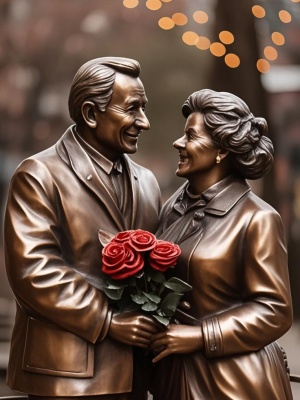The Timeless Allure of Vintage Sculpture: A Collector's Guide
Introduction: The Enduring Appeal of Vintage Sculptures
Vintage sculptures represent a fascinating intersection of art history, craftsmanship, and cultural heritage. These three-dimensional artworks from bygone eras continue to captivate collectors and art enthusiasts alike with their timeless beauty and historical significance. Unlike mass-produced decorative items, authentic vintage sculptures carry the imprint of their time - whether it's the elegant curves of Art Nouveau, the bold geometry of Art Deco, or the expressive forms of Mid-Century Modernism.
For those new to collecting or simply appreciating vintage sculpture, understanding the key aspects of this art form can significantly enhance the experience. This comprehensive guide explores the world of vintage sculpture, offering insights into identification, valuation, preservation, and the joy of building a meaningful collection.
Identifying Authentic Vintage Sculptures
Recognizing Period Styles
Each historical period left its distinctive mark on sculpture. Some key characteristics to look for include:

- Art Nouveau (1890-1910): Flowing organic forms, nature-inspired motifs, and elegant female figures
- Art Deco (1920-1940): Geometric shapes, streamlined forms, and stylized human figures
- Mid-Century Modern (1940-1970): Abstract forms, experimental materials, and minimalist aesthetics
Materials and Techniques
Vintage sculptures were created using various materials, each requiring specific examination techniques:
- Bronze: Look for foundry marks, patina quality, and weight
- Ceramic/Porcelain: Check for maker's marks, glaze consistency, and firing techniques
- Wood: Examine tool marks, aging patterns, and joinery methods
For more detailed information on art authentication techniques, visit our AI Art Guide which includes modern methods of verifying artwork authenticity.
The Collector's Dilemma: Common Challenges and Solutions
| Problem | Solution |
|---|---|
| Authenticity concerns | Consult specialized appraisers or use digital authentication tools |
| Condition issues | Work with professional conservators for restoration |
| Storage and display | Invest in climate-controlled display cases and proper lighting |
| Market valuation | Track auction results and consult multiple experts |
Preserving Vintage Sculptures: Best Practices
Proper care is essential for maintaining the value and beauty of vintage sculptures. Here are key preservation guidelines:
- Environmental Control: Maintain stable temperature (65-70°F) and humidity (40-50% RH)
- Cleaning Techniques: Use soft brushes for dusting; avoid chemical cleaners
- Handling Procedures: Always wear gloves and support the sculpture from its base
- Lighting Considerations: Use UV-filtered lighting and limit direct sunlight exposure
For delicate restoration projects, consider our AI Photo Restoration services which can help document and analyze sculpture conditions.
Building a Meaningful Collection
Developing a vintage sculpture collection should be both personally rewarding and financially sound. Consider these strategies:
- Define Your Focus: Choose a specific period, material, or artist to specialize in
- Educate Yourself: Study art history, attend auctions, and visit museums
- Build Relationships: Connect with reputable dealers, auction houses, and fellow collectors
- Document Your Collection: Maintain detailed records including provenance and condition reports
For inspiration on displaying your collection, explore our Gallery showcasing various art presentation styles.
Conclusion: The Lasting Value of Vintage Sculpture
Vintage sculptures offer more than just aesthetic pleasure—they serve as tangible connections to artistic movements and cultural moments of the past. Whether you're drawn to the elegance of a 1920s bronze figurine or the bold simplicity of a 1960s abstract piece, each vintage sculpture tells a story worth preserving.
As the market for vintage art continues to evolve, informed collectors who understand both the artistic and practical aspects of sculpture acquisition will find the most satisfaction in their pursuit. Remember that building a meaningful collection takes time, patience, and continuous learning—but the rewards of living with these pieces of history are immeasurable.
For further reading on art preservation techniques, consult the Getty Conservation Institute, a leading authority in art conservation.
